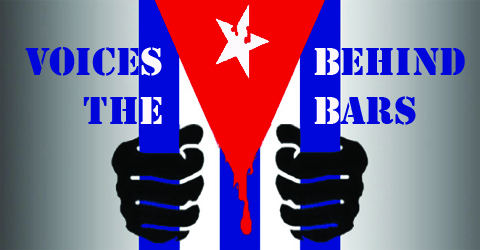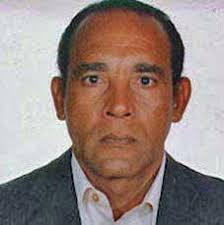
Miguel Galban speaks before the International Confederation Union.
First and foremost, I would like to express my gratitude to all of you for allowing me this opportunity to be here with you today. I will briefly tell you about what happened to me in my country. My name is Miguel Galban Gutierrez, and I was imprisoned during the Black Spring of 2003, being sentenced for 26 years of confinement, and afterwards, I was condemned to a life sentence by the Ministry of the Public Prosecutor. My trial did not consist of any lawful procedures, at all. At the moment of my detainment, I was the sub-director of the National Center for Training Labor Union (CNCSL) and a journalist for the independent newspaper Habana Press. My work simply consisted of denouncing the Cuban reality to the rest of the world, and similarly, in the union, my job was to provide the peaceful opposition and the Cuban workers with efficient information that would further allow them to defend their rights as workers.
I graduated with a degree in Mechanical Engineering, and later completed my Masters Degree in Maintenance. I would like to point out that, ever since the year 1998, the Cuban government has denied me the right to perform as a professional just because of my political views and my rebellious attitude. Let’s not forget that in my country the only employer is the government.
I must tell you all that during my unjust confinement, which lasted longer than 7 and a half years, I was tortured both physically and mentally, and I was humiliated and harassed both my prison guards and by officers from State Security.
When I was first thrown into prison, they placed me in a penitentiary that was located nearly 180 Kilometers from my house. This prison was known as the dark and fearful Aguica, a stronghold of torture and horrible treatment, considered by the regime to be at the “forefront” of all those other terrible places which can be found throughout my entire Cuban island. When I arrived at that place, there was a sign hanging at the entrance which foreshadowed the horrors I was about to endure in that living Castro-ite hell. It read: “You have arrived to Aguica. If you don’t fix yourself, we’ll fix you.” And so they would try, with the only two methods that they know- horrible treatment and beatings. I was able to confirm this on many occasions during my stay there for four years in a half, while they kept me confined to that dungeon of torture known as 15 & K, which happens to be the same spot where the headquarters of the National Direction of Established Penitentiaries resides.
The most repressive of the torturers there was captain Emilio Cruz Rodriguez. I recall one occasion when he applied an asphyxiation technique on me, with the help of various henchmen of course. This painful process consisted of him pressuring both of his hands around my neck, pushing down on my carotid artery until I was at the point of nearly passing out. For a few days after that, the area which he pressed down on was deeply bruised. He got permission to do all of this from the director of the prison unit, captain Diosdado More and a State Security official called Porfirio Penate.
This place I am telling you about does not offer the prisoners adequate food or medical care. We lived in subhuman conditions, while we’re all crammed into overcrowded spaces- spaces which are about 24 meters squared, where 24 prisoners must live side by side. There is a lack of ventilation, illumination, and the hygiene is terrible. There is no psychiatric attention available for the prisoners, and therefore, the levels of suicides and self-inflictions are very high in comparison with other jails throughout the country. Furthermore, the prisoners do not have the right to receive any mail, while the few who are actually allowed to receive some have no privacy whatsoever, for guards give them in their letters only when they have read it first and understood it. Only then can a prisoner receive his open envelope.
As for the medical attention I received during my prison years, I can say that it was nearly nonexistent. I waited for more than 5 years to have an endoscopy performed on me because of my gastrointestinal problems. My vision has been strongly affected, as has been my hearing. Many of my teeth have deteriorated while some of them are missing, due to the strong pains which I felt in some of them, leaving me no other choice than to take them out. The stress I suffered from left some serious consequences, as well as lots of damage to my memory. I have undergone some serious misfortunes that will forever mark my life, like the death of my mother, who passed away on October of 2008. Her death was not a product of a biological disease, but instead solely due to all the suffering she went through because of my unjust and cruel imprisonment. In addition, she was not able to visit me, for the distance was very far and she was not able to travel for such long trips. The Cuban authorities only allowed me to see her twice.
The Cuban regime did not just condemn us, but also our families. They were victims of such repressive mechanisms for 7 years and a half. We must keep in mind all the difficulties they confronted just to visit us and take us essential things we needed to survive in those cemeteries of living men. Our families deserve to be acknowledged for all their bravery.
My niece, who was doing very well in her job as an information specialist, was forced to quit after they punished her with slashing her salary by 50%, for the sole reason that the Cuban Intelligence Unit had found out that she received an e-mail from someone abroad who was asking about my condition.
Cuba has not changed, and it violates all international covenants of the International Worker’s Organization (OIT) which it has signed. Cuban workers are continuously denied the right to strikes, to peacefully protest, and to move freely to the capital to find work. Workers on the island are defenseless in the face of such arbitrary measures formulated by their employers, they suffer discrimination at work for political beliefs, and they are forced to affiliate themselves with the CTC which is the official union that is a subordinate of the state and run by the Communist Party. Furthermore, they are required to assist political activities and must be paid according to union quota.
I find myself here today not because I was released as a result of a gesture of goodwill on behalf of the Cuban authorities. Instead, I have been used as a token of trade which had the objective of ending the measures which the European Union has kept towards the Castro regime. My decision to accept such a deportation has been strictly because of family, for they could no longer continue to be victims of the dictatorship. They deserve honorable lives, decent lifestyles, and to live in freedom just like our creator wanted for all people.
We hope we can count on support from all of you so that during the next International Worker’s Conference, which is scheduled to take place on June 2011 in Geneva, the Republic of Cuba will be included in the list of the 25 countries which violate worker’s rights the most. We hope that a mission goes underway that members of the CSI or of OIT could meet with Cuban union members, whether they are official or independent, so that they can see the reality. Independent workers carry out their labor in very dangerous conditions, just like my own case which I testified here before you: they sent us to prison with very long sentences, forcing us to live side by side with actual dangerous criminals charged with elevated rate of dangerousness, molesters, and murderers. In addition, we hope that our case be present in the OIT and in the annual report made by the CSI, because the Castro-brother’s government continues with its inactivity.
May God bless you all,
Thank you very much,
Miguel Galban
October 24, 2010
Categories: Miguel Galban Gutierrez . . Author: voicesbehindbars . Comments: Leave a comment









